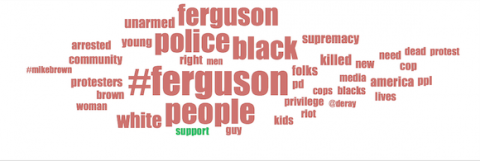Question: What other content is mentioned in the tweets that state "black" or "white"? How are tweeters using these terms in response to the Ferguson shooting of Mike Brown by Darren Wilson?
Analysis of Word Cloud: When examining my word cloud, it wasn't surprising to see that there was only one positive (green) word (which happened to be "support"). It was also interesting to see the terms "privilege" and "supremacy" appear, but once I looked at the tweets, it was no surprise that they were linked to the term "white." Therefore, the word cloud allowed me to see the common themes of white dominance in America, and inequality among the races. I was interested in evaluating the tweets regarding Ferguson that used the terms "black" and "white" to see how people were talking about the two. Most commonly, they were pitting one against the other. More often than not, they were discussing the inequalities among blacks and whites. One example comes from the popular Ferguson activist @deray, "These National Guard Humvees are meant to calm white fear and stoke black anger. Gov. Nixon wants violent confrontation. #Ferguson." It is no surprise that "#Ferguson" was one of the most commonly used terms in the "black" and "white" tweets. The themes tended to center around the racial divide in America.
Conclusions drawn from further investigation: Initially, I thought searching these keywords would lead me to a more centered focus on the predominately white police force harming black males. However, a vast majority of the tweets were comparing and contrasting the two races. The word cloud even shares harsh undertones of the racial divide with terms regarding white supremacy, and white privilege. Yet, the words most commonly linked to "black" were words inferring murder of the innocent. In the word cloud format, emphasis is placed on Ferguson, the police, the inherent racial divide among blacks and whites, and the people who were involved, such as Mike Brown. I do not believe any information is downplayed, seeing as racial inequality is obviously a big issue within the United States. However, although "support" was considered a positive word, it was most commonly used negatively in tweets. Most tweets were implying that Ferguson activists do not receive enough support, and that more support could always be of value. This relates to “Big Data: Methodological Challenges and Approached for Sociological Analysis” because although big data is useful, there are many mistakes to be made when observing things online and making assumptions. For example, "support" was not always used positively, although deemed a positive word. Big data's usefulness is also balanced with its limitations. My expectations and assumptions I based off of the word cloud were often proven wrong, and it just goes to show that limitations exist within big data analysis.
- Log in to post comments
